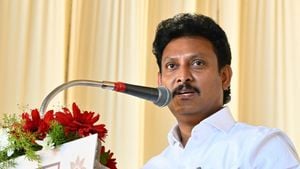Alice Weidel, leader of Germany's far-right Alternative für Deutschland (AfD) party, is at the center of increasing public protests as she campaigns for the chancellorship. Weidel’s unique position as an openly gay politician amplifies the complexity of her candidacy, especially as her party is often criticized for its staunch anti-immigrant and nationalist policies.
On one side, Weidel has garnered support from international figures including Elon Musk and Hungary's Prime Minister Viktor Orban, who refer to her as the “uncrowned queen” of the AfD. On the other, she faces fierce opposition demonstrated through protests and public backlash. Recently, around 250 people gathered to voice their dissent against her at a rally held on Saturday afternoon in Einsiedeln, Switzerland, where Weidel resides with her partner and children.
The rally atmosphere was heated, marked by shouting and scuffles, as demonstrators from the “Alliance Against the Right” accused Weidel of social coldness. Activists chanted messages of diversity and denounced what they deem her fascist associations. Posters reading “Weidel out” and “History repeats itself if you don’t learn anything” filled the area as the crowd marched through Einsiedeln.
Despite the protests, Alice Weidel's popularity appears precarious but steadfast, with polls indicating her party is projected to achieve significant results, possibly around 20 percent of the vote. Commentators have observed how Weidel’s presence is enabling AfD to “normalize” its image, shedding its past of extremism to draw traditional voters previously put off by the party's image. The Der Spiegel magazine described Weidel as the “perfect fig leaf” for the AfD. While she is openly part of the LGBTQ community, some critics argue her affiliations with the party mask broader issues of misogyny, homophobia, and xenophobia within its platform.
Weidel, who idolizes Margaret Thatcher, is unapologetically promoting the AfD’s hardline policies, including massive border closures and what she terms “remigration.” This kind of rhetoric is echoed throughout her campaign speeches, rallying party supporters to push back against immigration and cultural diversity, even as she navigates her personal life as the mother of two children alongside her partner.
At the recent Einsiedeln protest, notable police presence was reported, reflecting the tensions brewing between supporters and opponents of Weidel. The police intervened during confrontations with counter-demonstrators, who displayed both AfD posters and Swiss flags. Some individuals were temporarily detained for carrying prohibited items or for resisting police orders.
Meanwhile, Weidel continues to leverage her identity as part of her campaign, openly discussing her relationship with her partner, even as she distances herself from broader LGBTQ issues. During political rallies, she insists on her autonomy from activist categorizations, stating, “I will not tolerate any interference in my life or my family.” These words seem to resonate with her supporters, who view her as a modern representation of conservative values, even against the backdrop of her party's controversial ideology.
The stark dichotomy of opinions surrounding Alice Weidel encapsulates the complications faced by political figures within the far-right spectrum, particularly as they navigate issues of identity, societal acceptance, and extreme political ideologies. The upcoming election will prove pivotal, potentially reshaping the political narrative not only for Weidel but also for the AfD as it seeks to secure its place within the German political framework.
While the protests aim to challenge Weidel's vision for Germany, her ascendance and unique position will likely continue to provoke reactions across the political spectrum as the country grapples with its identity, values, and the influence of right-wing politics on public discourse.



